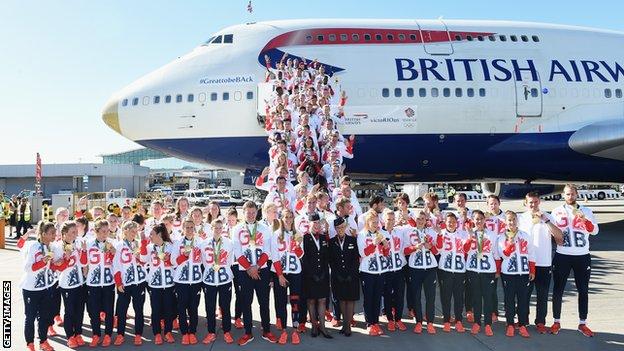The GB Olympics 2016 team returned from Rio to the UK today - welcomed with the enthusiasm of Caeser entering Rome in triumph. Whole libraries of articles and books will be published about the signficance of their success, for them and for us, as adoring citizens.
So here's a few of my undeveloped thoughts about communication and the Olympics. They are just the undeveloped inklings of what have popped into my head while negotiating the chaos that is the A5 through the West Midlands.
I would have to embark on a four-year programme of arduous mental exercise and scientifically-proven brain nutrician to flesh them out into lycra-ripping medal-winning brilliance. So I won't try.
1. The story makes the difference
Most of us love a winner. But a winner who has a back-story, that's something even better. Story telling was at the heart of Olympic media coverage. So British cyclist Becky James who was badly injured and ill before riding to Olympic glory (well, silver medal) sticks in the mind. Laura Trott and Jason Kenny being engaged is big news. Nick Skelton breaking his neck and climbing back on to his horse: the personal, physical and emotional journey that athletes have been on really capture the imagination. It is what moves us that counts. It's what myth is made of.
2. People need heroes
Sports men and women are outsiders. They are not normal. They achieve the superhuman feats for us. In the past they would be warriors, even political leaders. Now, it's sports stars. Communications from them affect us more powerfully. Businesses sponsor sports stars to share their glory. Business people can do this more directly. Think of Richard Branson the risk-taking adventurer. Bill Gates the philanthropist. Steve Jobs the innovator. John Timpson the decent employer. Being a hero, in even the smallest way, can win new fans.
3. The search for meaning is relentless
Driven by the media, once an event has occured, or a story has been told, we all start asking: what does it mean? And if we don't, the media will. The obsession with the medal table and Great Britain coming second, above the Chinese, is part of this. The Olympics was once conceived as an event where people can take part together. Not much more. Now, it's an expession of national psche and success that can propel a whole nation forward to glory. Or not, depending on your point of view.
4. Great achievements can be easily undermined
The US swimming team achieved great Olympic deeds. Then four of them conspired in a moment of foolishness to undo much of the positive effect by clumsily trying to cover up the fact that they broke a toilet. From podium-topping victory is snatched defeat. Secondly, the Brazilian nation should be celebrating the games' success. But when asked what comes to mind when they think of Brazilians and the Olympics, many people could well say booing. That's not a good impression.
5. The winners take it all
The Olympics suggested we're becoming ever more obsessed with winners. The opportunities presented to the successful few who won medals will be significant, but will come with risks. Their share of market and share of voice in the sports marketing world will be disproportionately large. While those who did their very best, probably sacrified just as much, but did not get medals will struggle on pretty much unseen. It will remain tough out there for the 84% of UK athletes who came home with no medal.
6. It's the start of a journey
Many of the medal winners will have to learn quickly the significance of what's happened to them. They have a right to reap the longer term rewards. It would be a good idea to think seriously about how to do this. A moment of magic in Rio could be the start of a very positive journey if they optimise their personal marketing strategy, with PR and social media at the forefront. That might be to get as much exposure as possible, or as much privacy, while achieving post-Olympic goals.

